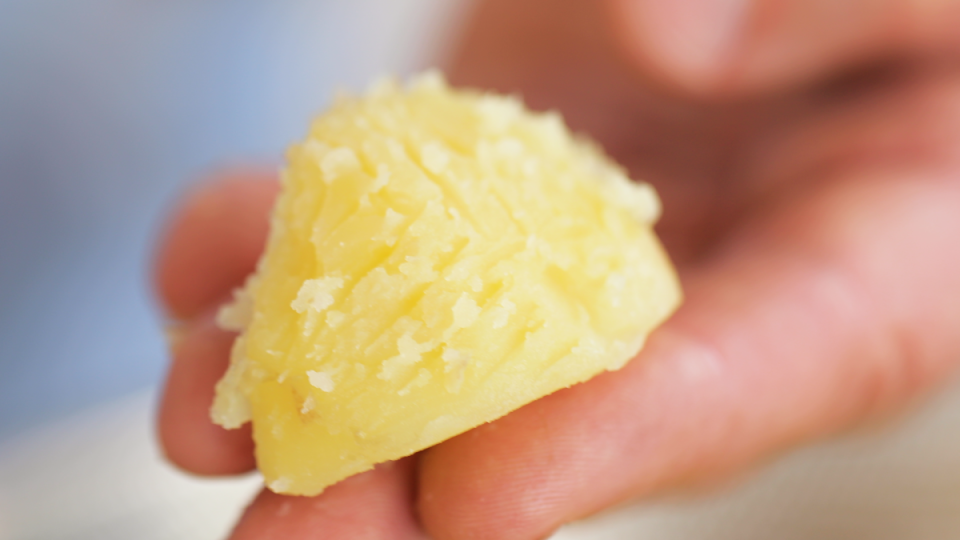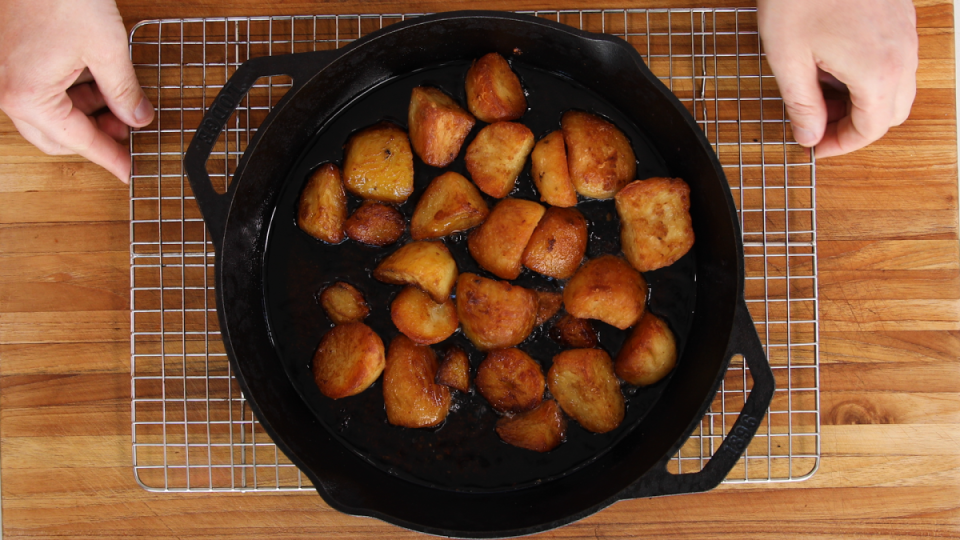I’m a Chef and My Wife Says My Extra Crispy Roasted Potatoes Changed Her Life

Jon Ashton's Crispy Roasted Potatoes
It's easy to love potatoes. Whether it's a pile of French fries next to a juicy burger, a perfectly baked potato with a steak or a bowl of smooth and creamy mashed potatoes on the Thanksgiving table, I'm here for all of them. But one of my favorite potato recipes are my extra-crispy roasted potatoes. They're roasted using a classic British method, which makes them exceptionally crispy on the outside and soft and fluffy on the inside. How good are they? Well, my wife says that this recipe changed her life. If you're in the mood for some life-changing roasted potatoes, here's what you need to know.
Related: The Best Lemon-Roasted Potatoes
What Potatoes Are Best for Roasting?
To me, there's one potato that's the best for roasting: Yukon Gold potatoes. They have a lower starch content and a higher sugar content than other potatoes, which helps create a roasted potato with a crispy golden exterior and a soft and creamy center. They also have thin skin with not too many eyes, which makes them easier to peel than something like a Russet potato.
Do You Need to Boil Potatoes Before Roasting?
You don't have to boil your potatoes before roasting, but I've found that boiling them before roasting helps create the soft and creamy centers that you're going for. They're the perfect contrast to the extra-crispy exterior, which is created by a combination of factors (see below).
When you boil your potatoes before roasting, make sure to cut the peeled potatoes into large pieces and don't cook them too long. You want to cook them only until the centers offer a bit of resistance when pierced with a paring knife, which should take about 10 minutes. If you cook them until they're very soft they'll fall apart, so it's important to keep an eye on them and test them occasionally.

Jon Ashton
What's the Trick to Crispy Roasted Potatoes?
I use a few tricks in this recipe to really pump up the crispiness.
? Add baking soda to the cooking water. Baking soda can help your cakes and cookies rise, but it's also great at changing the pH of water, which is what I'm using it for here. Baking soda will make the cooking water more alkaline, which helps break down the pectin and exteriors of the potatoes, creating a starchy slurry that turns into an extra-crispy exterior when the spuds roast in the oven.
? Rough 'em up. Tossing the parboiled potatoes in a colander roughs up the baking-soda-softened surface of the spuds, creating a coarse surface that speeds evaporation and makes the outside of the potatoes even crispier. If you don't have a colander, you can rough up the outside of the potatoes with a fork.
? Use the right pan. I used a shallow cast-iron pan, but a baking sheet also works. Don't use anything that's too deep, though (like a Dutch oven) because the potatoes will steam instead of roast.
? Crank up the heat. I roast my potatoes at 425°. I find that temperature does a great job of creating the brown and crispy crust.

Jon Ashton
How Long Should You Roast Potatoes?
To make sure you get a brown and crispy crust, stick the potatoes in the oven and leave them alone for about 20 minutes. This initial baking time will get the crispy crust going, then you can flip and toss the potatoes again and roast them until they're golden brown all over and soft on the inside, which will take about 30 minutes more.
What Should You Serve Roasted Potatoes With?
Roasted potatoes (especially these) are a crowd-pleaser and go well with so many things. Here are just a few recipes to get you started. Remember that it's also totally ok to serve them as is with some ketchup or mayo for dipping.
? Perfect Prime Rib
? The Easiest Roast Beef
? Easy Roast Chicken
? Instant Pot Leg of Lamb
? Simple Skillet Pork Chops
? Sorta Fancy Stuffed Chicken Breasts
Life-Changing, Extra-Crispy Roasted Potatoes
Ingredients
1 tbsp plus 2 tsp kosher salt, divided
1/2 tsp baking soda
4 pounds Yukon Gold potatoes, peeled and cut into quarters
6 tbsp extra-virgin olive oil, divided
1. Adjust oven rack to lowest position, place rimmed baking sheet or large cast-iron skillet on rack, and heat oven to 425°.
2. Place 1 tablespoon salt, baking soda and potatoes in Dutch oven; add 2 quarts of cold water. Bring to a boil over high heat; reduce heat and gently simmer until exteriors of potatoes have softened but centers offer resistance when pierced with paring knife, about 10 minutes.
3. Drain potatoes in a colander and shake to rough up the surface. Place in large bowl and drizzle with 2 tablespoons oil and sprinkle with 1/2 teaspoon salt. Using rubber spatula, toss to combine. Drizzle with another 2 tablespoons oil and 1/2 teaspoon salt. Continue to toss until potato exterior is coated with starchy paste, approximately 1 to 2 minutes.
4. Remove baking sheet from oven and drizzle remaining 2 tablespoons oil over surface, spreading them out evenly.
5. Transfer to oven and roast for 20 minutes. Remove baking sheet from oven. Using metal spatula and tongs, loosen potatoes from pan, carefully flipping each one. Shake pan and turn potatoes. Continue roasting until potatoes are deep brown and crispy all over, turning and shaking them a few times during cooking, 30 to 40 minutes longer.
6. Season finished potatoes with salt and pepper to taste.
